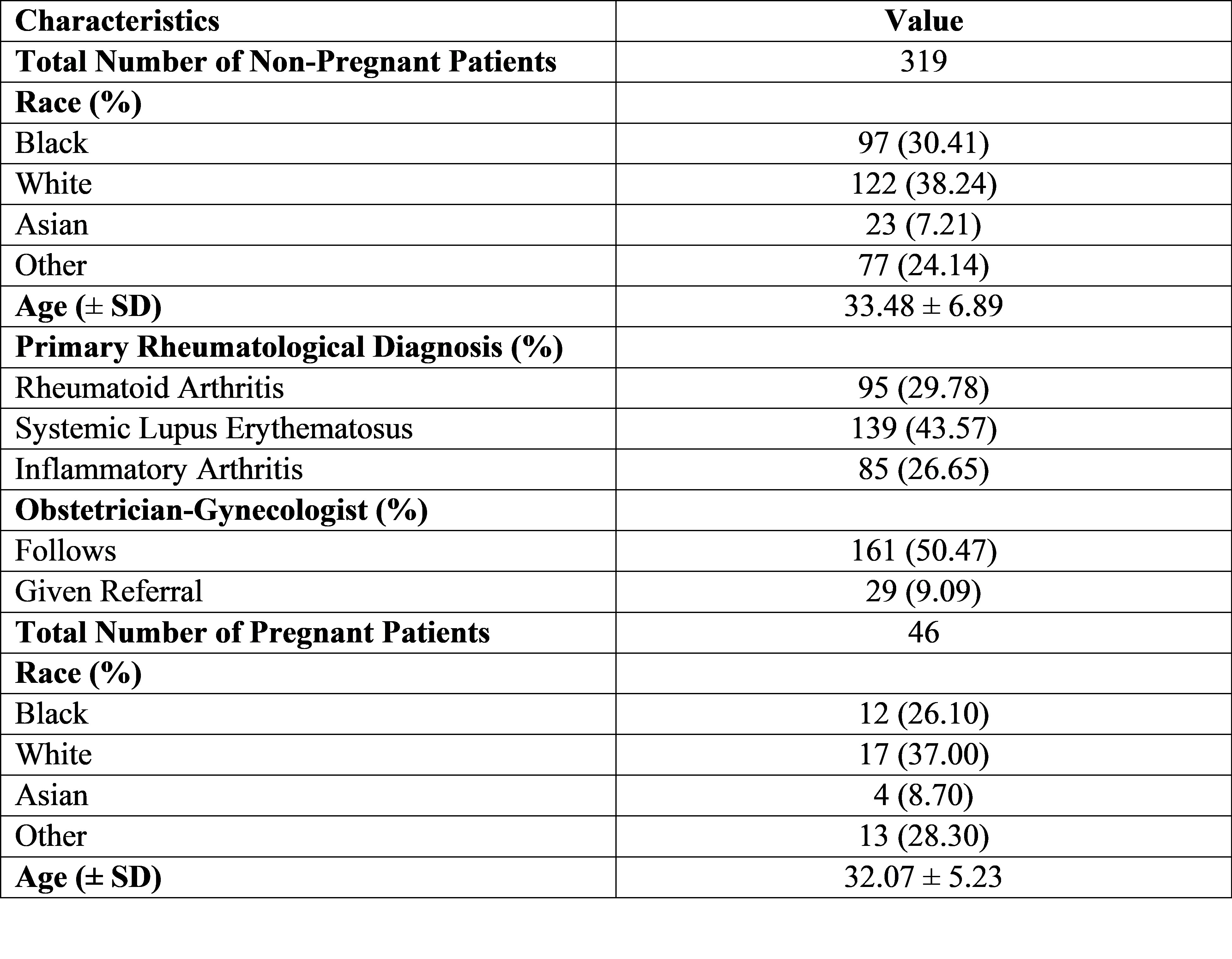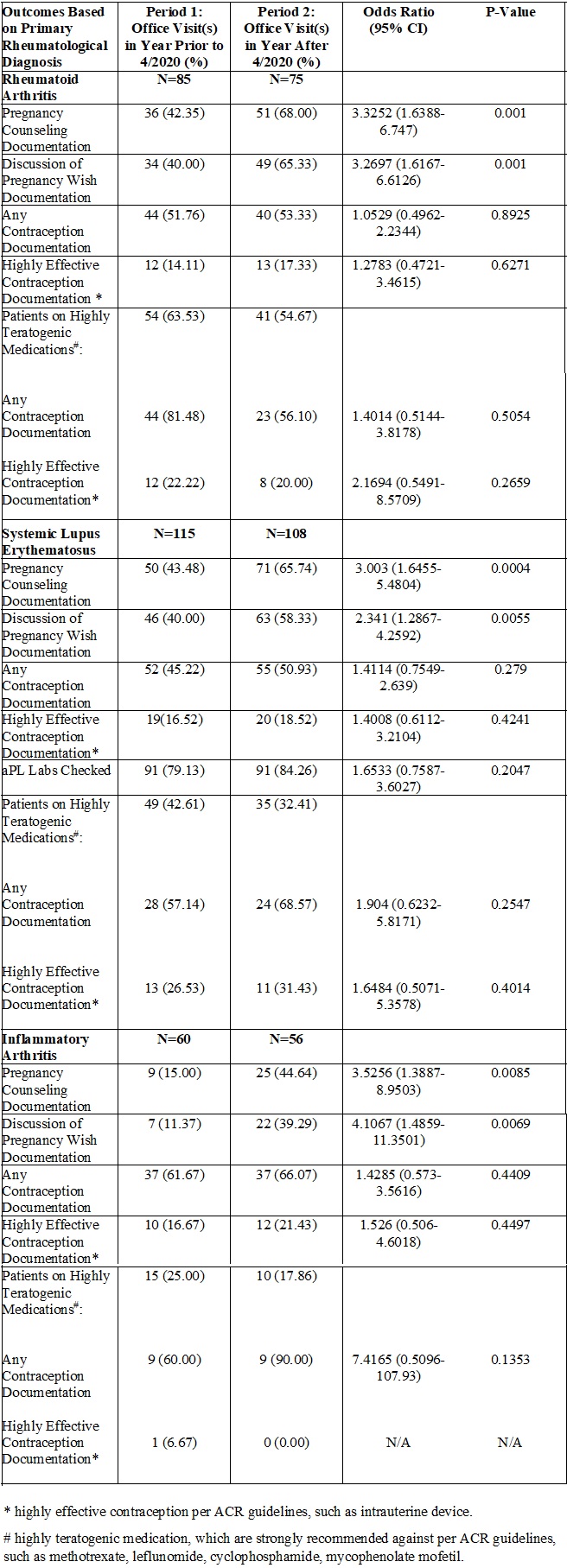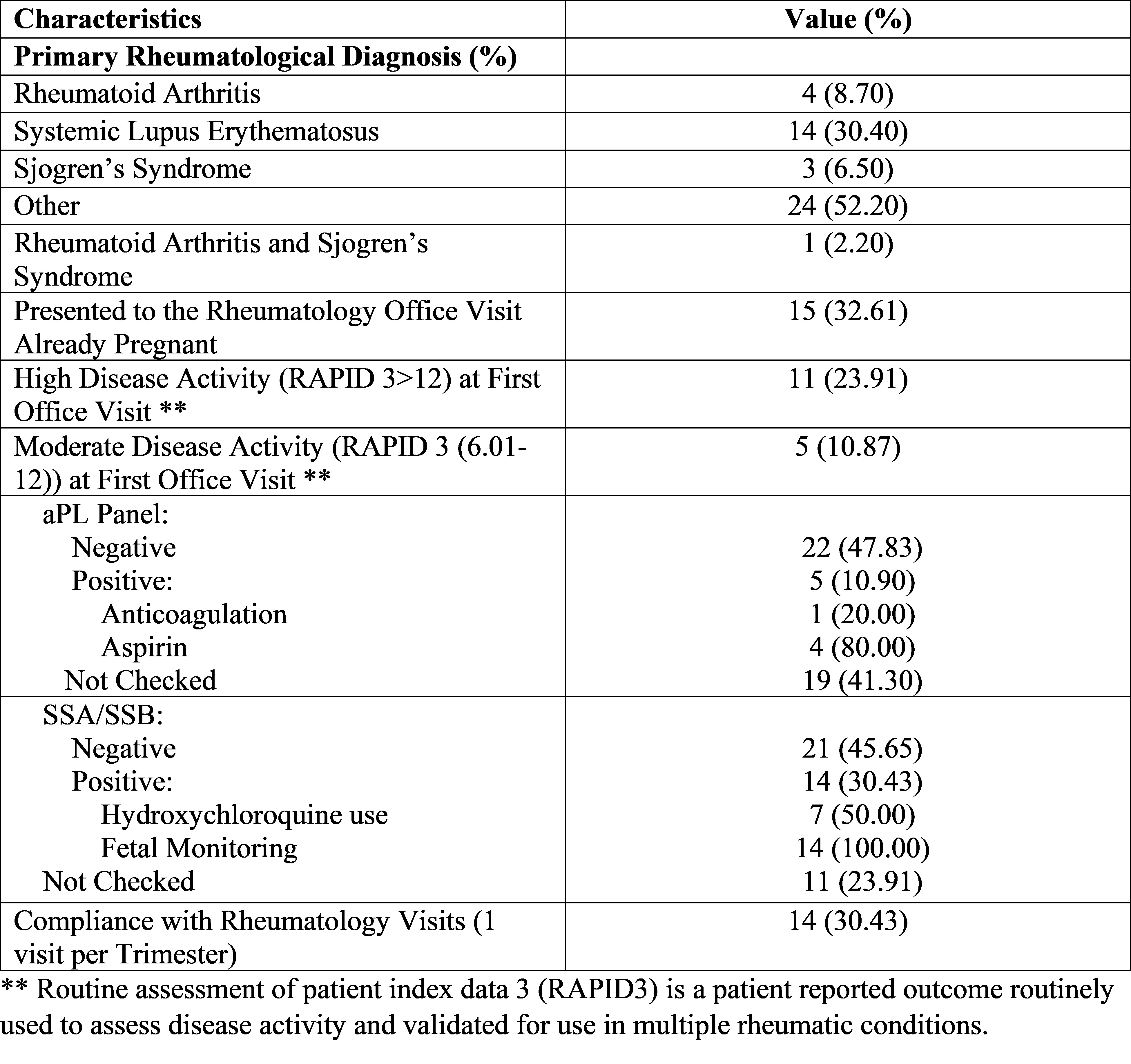Session Information
Date: Tuesday, November 9, 2021
Title: Reproductive Issues in Rheumatic Disorders Poster (1711–1731)
Session Type: Poster Session D
Session Time: 8:30AM-10:30AM
Background/Purpose: Successful pregnancies in patients with rheumatic disease are possible when they are well-monitored, adequately treated, and planned during periods of disease quiescence. Previously, a lack of standardized guidelines and physician-patient discussions around reproductive health created risks for poorer outcomes. The ACR’s reproductive guidelines include recommendations on contraception use, medication, and pregnancy with an emphasis on patients’ inputs on pregnancy desires.1 This study evaluates changes in rheumatologists’ practice at an academic medical center following the publication of the ACR’s reproductive guidelines.
Methods: Retrospective chart review was performed on reproductive age females (18 – 45 years) with ≥2 rheumatology office visits during the period of April 1st2019 to March 31st2021 and with the diagnoses of RA, SLE, and inflammatory arthritis (IA). The following data were collected: demographics, pre-pregnancy counseling, pregnancy wish, contraception usage via review of medication list or documentation, gynecology visit, and teratogenicity of medication. Generalized linear mixed models were used to evaluate for improvements in documentation regarding pre-pregnancy counseling/wish and contraception use, the year after the publication of the ACR guidelines (Period 2) compared to the year before (Period 1). For pregnant patients, additional data on aPL status, SSA/SSB, and pregnancy monitoring were collected and expressed as percentages depicting degree of compliance with the guidelines.
Results: Out of a total of 425 patients, 60 had undergone permanent birth control. Demographics for the remaining 319 non-pregnant women are shown in Table 1. There was a significant improvement in documentation related to pre-pregnancy counseling and discussion of pregnancy wish in Period 2 as compared to Period 1 as illustrated by the following odds ratios (OR): RA 3.33 [95% confidence interval (95% CI) 1.64-6.75], 3.27 [95% CI 1.62-6.61]; SLE 3.00 [95% CI 1.65-5.48], 2.34 [95% CI 1.29-4.26]; IA 3.53 [95% CI 1.39-8.95], 4.11 [95% CI 1.49-11.35], respectively. There were no improvements in areas of contraception use/documentation in all disease categories: patients on any contraceptive: 133 (51%) in Period 1 and 132 (55 %) in Period 2 (Table 2).
Of the 46 pregnant patients, all were followed by an obstetrician but only 14 (30 %) followed with their rheumatologist once per trimester. 15 patients (33%) presented to their rheumatology visit already pregnant and 16 (35%) conceived with high/moderate disease activity. Of the pregnant patients with positive SSA/SSB, all had adequate fetal monitoring but only half were on hydroxychloroquine (Table 3).
Conclusion: In the year following the publication of the ACR reproductive guidelines, there was improvement in documentation related to pre-pregnancy counseling and pregnancy wish. However, we identify ongoing practice gaps with regards to encouraging contraception use and aspects of pregnancy management.
1. Sammaritano LR et al. 2020 American College of Rheumatology Guidelines for the Management of Reproductive Health in Rheumatic and Musculoskeletal Diseases. Arthritis Rheumatol 2020 Apr;72(4): 529-556.
 Table 1: Demographics of Reproductive Age Females: Pregnant and Non-Pregnant Patients.
Table 1: Demographics of Reproductive Age Females: Pregnant and Non-Pregnant Patients.
 Table 2: Differences in pregnancy counseling/wish documentation and contraception use when comparing office visits the year before (Period 1) with the year after (Period 2) the publication of the ACR’s Reproductive Guidelines: Nf319 non-pregnant, reproductive age females.
Table 2: Differences in pregnancy counseling/wish documentation and contraception use when comparing office visits the year before (Period 1) with the year after (Period 2) the publication of the ACR’s Reproductive Guidelines: Nf319 non-pregnant, reproductive age females.
 Table 3: Outcomes of 46 Pregnant Patients from April 1st, 2019 to March 31st, 2021.
Table 3: Outcomes of 46 Pregnant Patients from April 1st, 2019 to March 31st, 2021.
To cite this abstract in AMA style:
Zhou Y, Hassan S. One Year After the Publication of the American College of Rheumatology (ACR) Guidelines for Management of Reproductive Health in Rheumatic Diseases, Has Anything Changed? An Analysis of Rheumatology Practice at a Tertiary Care Medical Center [abstract]. Arthritis Rheumatol. 2021; 73 (suppl 9). https://acrabstracts.org/abstract/one-year-after-the-publication-of-the-american-college-of-rheumatology-acr-guidelines-for-management-of-reproductive-health-in-rheumatic-diseases-has-anything-changed-an-analysis-of-rheumatology-p/. Accessed .« Back to ACR Convergence 2021
ACR Meeting Abstracts - https://acrabstracts.org/abstract/one-year-after-the-publication-of-the-american-college-of-rheumatology-acr-guidelines-for-management-of-reproductive-health-in-rheumatic-diseases-has-anything-changed-an-analysis-of-rheumatology-p/
